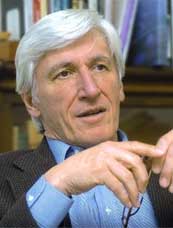By MARGA LINCOLN - Independent Record - 03/02/08
 Tim Coulter Photo by Eliza Wiley |
 Senator Carol Juneau |
The apology is an amendment to the Indian Health Care Improvement Act Reauthorization, which the Senate passed Tuesday by an 83-10 vote.
Both Robert "Tim" Coulter, founder and executive director of the Indian Law Resource Center in Helena, and state Sen. Carol Juneau, D-Browning, said they believe the apology is sincere.
However, both added that Congress needs to take the next step of changing ongoing policies that continue to harm Indians.
"I do think it's a meaningful action by Congress to recognize for the last whatever 300 to 400 years of what has happened to American Indian people in the United States," Juneau said.
In part, the amendment reads: "The United States through Congress apologizes on behalf of the people of the United States to all Native Peoples for the many instances of violence, maltreatment and neglect inflicted on Native Peoples by citizens of the United States."
The apology does a good job of identifying what has happened to Indian people since the arrival of nonIndians, Juneau said.
It acknowledges "the compassion and aid of Native Peoples" in the survival of the early settlements of Jamestown, Va., and Plymouth, Mass.
It also recognizes the "great assistance" Indian tribes provided Lewis and Clark on their epic journey to the Pacific Coast.
The amendment also lists some actions the federal government took against American Indians, including:
-- violating many treaties with Indian tribes;
-- forced removal of Indians from their traditional homelands;
-- armed confrontations and massacres, such as those at Sand Creek and Wounded Knee;
-- condemnation of Indian traditions, beliefs and customs; and
-- unlawful acquisition of tribal land and theft of tribal resources and assets.
This is not just ancient history, say both Coulter and Juneau.
"If it (the apology) is meant as a healing process, we also have to look at what is still happening," Juneau said.
She hopes the apology will be a catalyst for other congressional actions - such as increased funding for Indian education.
"Only 50 percent of our Indian kids are graduating from high school," she said.
Languages and culture continue to be lost today, and tribal lands are still being taken away, Juneau said.
"I'm from the Mandan, Hidatsa, Arikara reservation at Fort Berthold, N.D.," she said. "Our tribe was forcibly removed from our reservation and our land was flooded. My family lost our homeland."
Coulter, who has practiced Indian and human rights law for the past 30 years, urged that Congress inform itself and hold hearings about "U.S. law and policy as it relates to American Indian tribes and individuals."
The laws "are very antiquated and unjust," he said. "They are contrary to our own understanding of our Constitution."
Many of these ongoing injustices would surprise American citizens, he said.
For example, the 2004 Congress confiscated a $145 million judgment fund belonging to nine Western Shoshone tribes, he said, and then distributed the money to individual tribal members.
That action impoverishes and undermines the tribe, and "fundamentally steals the property of the tribe," Coulter said.
Congress continues to confiscate Indian land, he said. In the past few years, he said, it took land belonging to the Yurok Nation in California without providing compensation.
"Most people don't believe it is happening, but it is," he said.
Congress also believes it has the power to terminate a tribe's existence without a court hearing or trial, Coulter said. It has done it to hundreds of tribes, he said.
The U.S. government also claims power to control Indian land and resources "and then does it badly," he said.
"No one else is subjected to this kind of thing except people who are mentally incapacitated, children and Indian tribes.
"I think it's proper to thank members of Congress who are sponsors of this apology for their good intentions because the apology is called for, but the apology can't be considered serious or genuine unless congressional steps are taken to ensure that these ongoing wrongs are forever stopped."
The apology amendment is the third attempt by Sen. Sam Brownback, R-Kan., to pass a congressional apology to American Indians. He has pushed the measure since 2004.
"I don't think this (apology) is an issue that would divide America," said Coulter. "I think most Americans think it's something that should be put in the past and never repeated."
Both Montana senators, Democrats Max Baucus and Jon Tester, sponsored the Indian Health Care Act in the Senate.
In an e-mail statement, Tester said, "This apology is important because it recognizes the responsibility our government has to American Indians. Although it's meaningful, we need more than just words. We need action because there's a long way to go to make sure Indian Country has the resources and opportunities it was promised. Passing the Indian Health Care Improvement Act this week was a good first step."
The IHCIA has been referred to the House Committee on Natural Resources, and also the Committees on Energy and Commerce, and Ways and Means.
Reporter Marga Lincoln: 447-4074 or [email protected]